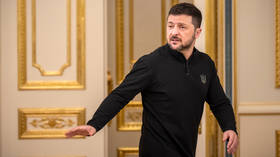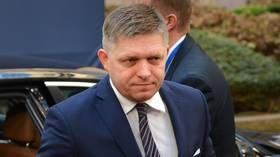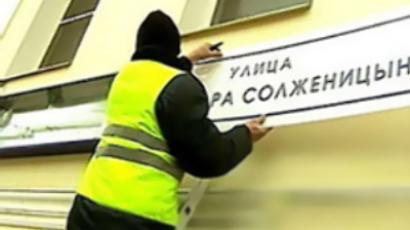Nobel prize winner Solzhenitsyn dies at 89
The man credited with exposing the brutality of Stalin’s purges and gulag system has died aged 89. Nobel prize winning author Aleksandr Solzhenitsyn was expelled from the Soviet Union in 1974.
Solzhenitsyn's books were the first to tell millions of people across the world about Stalin’s system.
Reaction to the news of Solzhenitsyn's death has flooded in from Russia and around the world. Russian President Dmitry Medvedev has expressed his condolences to the writer's widow and sons.
Messages of sympathy have also come from US President George Bush and France's Nikolas Sarkozy.
A man who shaped history with his writing
Aleksandr Solzhenitsyn served as a captain of artillery during World War II. But just before its end, the 26-year-old was arrested for criticising Stalin in a letter to a friend. His punishment was being sent to a labour camp for eight years.
His degree in mathematics and physics saved him from manual work during some of this time. He was placed in a specialised Moscow jail which employed scientists in research.
With Stalin’s death in 1953 came Solzhenitsyn's release from prison, but not freedom. He was sent into permanent exile to Kazakhstan where he worked as a teacher and wrote in secret.
Political censorship was liberalised when Khrushchev condemned the cult of Stalin's personality.
In 1962, Solzhenitsyn's short novel, ‘One Day in the Life of Ivan Denisovich’, brought him world recognition. The novel, showing the horrors of a day in a labour camp, brought global attention to the plight of those who suffered under Stalin.
Khrushchev's downfall saw a new wave of persecution against the writer and eventually censorship on all his books.
Solzhenitsyn's Nobel Prize for Literature in 1970 was denounced by the Soviet government as a politically hostile act.
His unpublished manuscripts were smuggled into the West, securing his fame as an opponent of government policies.
The confrontation grew more intense after publication abroad of his novels, ‘The First Circle and The Cancer Ward’ and later ‘The Gulag Archipelago’ – the most powerful and detailed account of the Soviet prison system and secret police.
The book had a strong international response, but angered Soviet authorities.
Solzhenitsyn was arrested, charged with treason and exiled from the Soviet Union in 1974. For many years, he and his family lived in a small town in Vermont, in the U.S.
His books played a vital role in discrediting the Communist regimes of the Soviet Union and Eastern Europe. But his criticism of Western-style democracy and pop culture alienated some of his former admirers.
The writer favoured an authoritarian system based on Russia's Christian tradition – as an alternative to the Soviet regime. His message was clear – the only salvation is to return to the virtues of religion and moral values.
Solzhenitsyn's ties with the homeland were revived with the start of Gorbachev's policy of perestroika. The new regime offered to restore his citizenship and later saw his books published in his homeland.
His return to Russia in 1994 was a world sensation, followed by a two-month whistle-stop tour across the country, from Vladivostok to Moscow. He criticised President Yeltsin's reforms and the government.
Trying to influence politics, he met with Yeltsin and later with Putin.
Solzhenitsyn continued writing in Moscow after his return to Russia. He published his work Russia in Collapse, a memoir of his exile and two volumes on the history of Russian-Jewish relations.
In June last year Solzhenitsyn was presented with a Russian state award for his outstanding humanitarian achievements.
In a televised speech Solzhenitsyn said he hoped that his works about the Soviet regime will never be forgotten.













